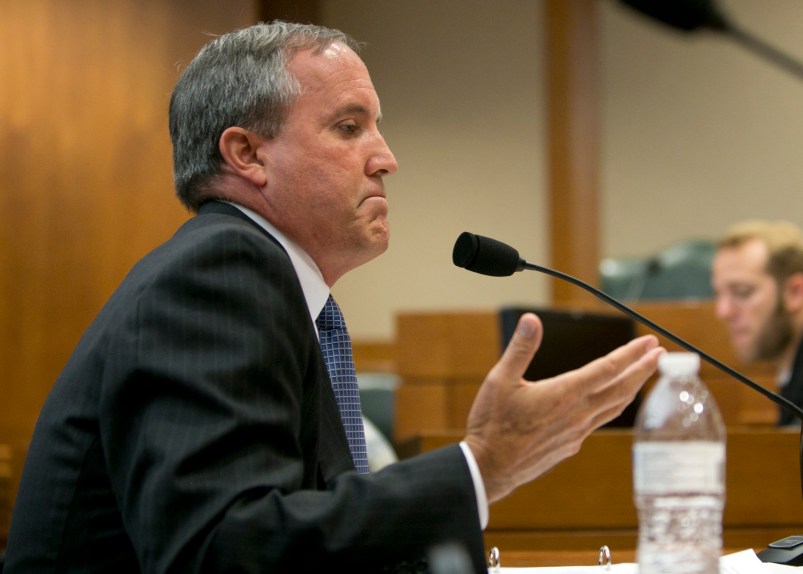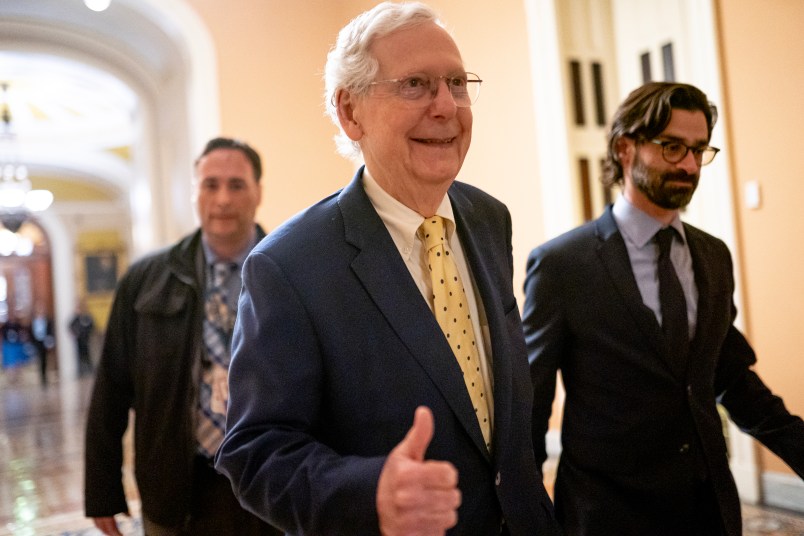The following is the first installment in a TPM series, Not Safe At Home. The series takes a look at fixes the next Congress and President should consider to how our democracy works. This essay is part of TPM Cafe, TPM’s home for opinion and news analysis.
The 2016 election of Donald J. Trump and the subsequent rightward turn of the Supreme Court are both a disaster and an opportunity for Democrats. The disaster is visible everywhere around us; the opportunity, understandably, is harder to discern. But the political system’s failure to prevent the election of a minority-backed, outrageously unqualified candidate, or to restrain him sufficiently once elected, demands that Democrats ask not just how to defeat Trump but how to fix the political system that seems prepared to ratify many of his party’s actions.
But asking questions about changing the way political power is allocated seems risky. The response is predictable: that isn’t the way the United States does things. In the popular imagination — especially among the political press — the United States’ past is a story of political stability, of battles fought sharply but within defined and persistent boundaries. The nation’s people and its policies have changed; its procedures — the argument goes — have not and therefore should not.
While this preference for stability may be justified as strategy, it is vacuous as history. The United States has survived not by keeping the same system but by transforming its rules at crucial moments.
Our historical amnesia about the reworking of our political system has significant consequences for the way we think about politics today. More so than in the past, U.S. politicians — even purportedly radical ones — have deeply constrained views about changing the rules of the political game: how the president is selected, how seats are allocated in Congress, how many states exist, how voting rights are defined, how much power the Supreme Court wields. Many of these contemporary constraints developed after World War II, in a broad liberal faith that a well-functioning Supreme Court can help fix the country without dirtying politicians’ hands.
But past U.S. politicians lacked that faith. In his Second Annual Message to Congress in December 1862, Abraham Lincoln dismissed some restraints of tradition as he and Congress waged the Civil War and prepared for the impending Emancipation Proclamation. “The dogmas of the quiet past are inadequate to the stormy present,” he wrote. “The occasion is piled high with difficulty, and we must rise with the occasion. As our case is new, so we must think anew and act anew.” So, Lincoln continued, “We must disenthrall ourselves, and then we shall save our country.”
This article is the first in a series on this topic of thinking and acting anew. TPM has asked historians and constitutional scholars to use their understanding of the historic changes in the U.S. political and constitutional systems to help us disenthrall ourselves today from the passivity or alienation that emerges when a people face problems that the political system seems unable to solve, and when leaders retreat from the challenge of devising solutions as vast as the challenges. Of course passing laws within the incumbent system matters. So too does seeking broader cultural change. But at crucial moments it is important to fix the political system, to go beyond playing within the rules and instead to improve the rules of the game.
The essays differ in their solutions but they share two common premises. First, that a Democratic victory alone will not be sufficient to fix the political system. Second, that the history of the United States provides useful models of politicians seeking to change the very political and constitutional system they worked within.
A Democratic victory in 2020 undoubtedly would restore some sense of decency in the country’s operation and brake the extremist positions of the current administration, but still the nation would not be safe at home. The conditions that prompted a Trump victory would remain intact, along with the probability of revanchist neo-Trumpite movements, perhaps led by his children. So, too, would Democratic victory only marginally stave off Republican state efforts to roll back voting rights, to attack necessary congressional delegation of regulation, to assault the rights of women to control their own bodies, to transform the nature of the Census in order to disadvantage Democratic states. The hope that the Supreme Court might save the country from an extreme right-wing agenda has died. The lifetime installation of Neil Gorsuch and Brett Kavanagh suggests that there are no referees who will save us. The best-case scenario for Democrats appears to be the survival of Democratic-appointed justices until 2021, a Democratic capture of both the presidency and the Senate in fall 2020, and a chance to sustain today’s moderate minority on the Court. This is better than losing even more seats on the Supreme Court, but is clearly insufficient to meet the actual challenges we face.
U.S. history provides a different, riskier, but in some ways more promising alternative. In my recent book The Second American Revolution: The Civil War-Era Struggle over Cuba and the Rebirth of the American Republic, I argue that Civil War and Reconstruction-Era Republicans permanently transformed the political system by methods that would appear shocking today. When Republicans needed more states to balance the Senate, they created them. When the Supreme Court threatened Republicans’ Reconstruction policies, Congress restricted the Supreme Court’s jurisdiction, added and then subtracted justices, and threatened to dismantle the court altogether. When the Constitution did not defend the civil and voting rights Republicans prized, they transformed the nation’s founding document through three sweeping constitutional amendments, the last two passed in the face of bitter opposition not only from white Southerners but from many white Northerners. Between 1860 and 1870, Congress considered many other constitutional amendments, including some to eliminate the Electoral College or to enfranchise women. In 1888, as Heather Cox Richardson has written, Republicans faced a Democratic Party that sought to build a permanent congressional majority by disfranchising black Southern voters; Republicans responded by creating six new western states between November 1889 and July 1890, though they tragically (and narrowly) failed to pass a voting rights bill. The new political map that Senate Republicans fashioned still shapes our world
Where did that sense of boldness go? In 2009 the Democrats possessed for a time a 60-seat bloc in the Senate, yet barely considered the obvious (in retrospect) move of adding Washington D.C. as a state, much less investigating the addition of Puerto Rico or the creation of multiple states out of California or New York. Of course Democrats look timid today next to Abraham Lincoln; what’s astonishing is how timid they look compared to Benjamin Harrison.
There is something fearful about facing the nation’s history. Our history of norm-busting politics suggests that Republicans today are less anomalous than Democrats might like to think. We forget the nation’s bloody and confounding political history because there is pleasure in amnesia.
But there is power in recognition. The Democratic Party has become adept at defining problems for which the party offers no realistic solution. Against the assault on voting rights and the outrages of partisan gerrymandering, Democrats passed — to their credit — a significant bill in the House of Representatives that will never pass the Senate; now the party seems prepared to wait for courts that seem unlikely to intervene. Against the overweighting of rural votes or the problems of the Electoral College, Democrats complain about unfairness, instead of proposing a fairer system. Even the most-radical major candidate to run in 2020, Bernie Sanders, inexplicably declined to support the timid act of undoing a non-constitutional filibuster rule in in the Senate, ensuring that even a 2020 Senate victory will mean that moderate Democratic bills are doomed to defeat at the hands of Mitch McConnell. Other Democratic candidates were often even more timid. The Democratic Party’s unilateral disarming not only makes the Democrats look weak; it also makes them look helpless, as if they are the party that tells people what cannot be changed.
If the United States does not face an existential crisis, if this is just another blip in the political road, then of course Democratic caution makes sense; so too does defense of the status quo. But if Democrats see this as a nearly unprecedented challenge to the nation’s ideals and images, then they must propose solutions as grave as the crisis. Perhaps it is time for us, too, to disenthrall ourselves from a hope that the United States will naturally right itself and to get about the work of saving our country.
The essays that follow argue, in different ways, that the past can provide some guidance as we do the painful but necessary work of expanding our sense of the possible, of assessing the problems in our political system, and of devising solutions sufficient to address them.
The “Not Safe At Home” series will be published over the next two weeks. Read the next article, here.
Gregory P. Downs is a professor of history at the University of California, Davis, and author of After Appomattox: Military Occupation and the Ends of War and The Second American Revolution: The Civil War-Era Struggle over Cuba and the Rebirth of the American Republic.









